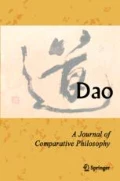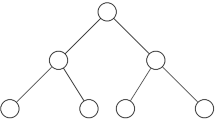Abstract
This essay argues for a new interpretation of the notion of “unity” in Yangming’s 王陽明 famous doctrine of the “unity of knowledge and action” (zhi xing he yi 知行合一). I distinguish two parts of Wang’s doctrine: one concerning training (gong fu 工夫), and one concerning the “original natural condition” of knowledge and action (ben ti 本體). I focus on the latter aspect of the doctrine, and argue that Wang holds, roughly, that a person exhibits knowledge in its original natural condition if and only if the person exhibits action in its original natural condition. Moreover, I argue that Wang denies that knowledge in its original natural condition is identical to action in its original natural condition.
Similar content being viewed by others
References
Angle, Stephen. 2018. “Buddhism and Zhu Xi’s Epistemology of Discernment.” In The Buddhist Roots of Zhu Xi’s Philosophical Thought, edited by John Makeham. Oxford: Oxford University Press.
Angle, Stephen C., and Justin Tiwald. 2017. Neo-Confucianism: A Philosophical Introduction. Cambridge: Polity.
Chan, Wing-tsit. 1963. Instructions for Practical Living and Other Neo-Confucian Writings by Wang Yang-ming. New York: Columbia University Press.
______ 陳榮捷. 1983. Wang Yangming’s Instructions for Practical Living with Detailed Notes and Collected Discussions 王陽明傳習錄詳註集評. Taipei 臺北: Taiwan Xuesheng Shuju 臺灣學生書局.
Chen, Lai 陳來. 1991. The Boundary between Being and Non-Being: The Spirit of Wang Yangming’s Philosophy 有無之境: 王陽明哲學的精神. Beijing 北京: Renmin Chubanshe 人民出版社.
Chen, Lisheng 陳立勝. 2015. “What Kind of ‘Unity’? How to ‘Unify’? A New Interpretation of Wang Yangming’s ‘Unity of Knowledge and Action’ 何種 ‘合一’? 如何 ‘合一’?——王陽明知行合一說新論.” Journal of Guiyang University (Social Sciences) 貴陽學院學報 (社會科學版) 3: 2–9.
______. 2019. The Pivot Between Human and Saint 人聖之機. Beijing 北京: Sanlian Shudian 三聯書店.
Cheng, Chung-yi 鄭宗義. 2018. “A New Interpretation of Wang Yangming’s Doctrine of the Unity of Knowing and Acting 再論王陽明的知行合一.” Academic Monthly 學術月刊 50.8: 5–19.
Ching, Julia. 1972. The Philosophical Letters of Wang Yang-ming. Canberra: Australian National University Press.
______. 1976. To Acquire Wisdom: The Way of Wang Yang-ming. New York: Columbia University Press.
Cua, Antonio S. 1982. The Unity of Knowledge and Action: A Study in Wang Yang-ming’s Moral Psychology. Honolulu: University Press of Hawaii.
Frisina, Warren G. 1989. “Are Knowledge and Action Really One Thing?: A Study of Wang Yang-ming’s Doctrine of Mind.” Philosophy East and West 39.4: 419–447.
______. 2002. The Unity of Knowledge and Action: Toward a Nonrepresentational Theory of Knowledge. Albany: State University of New York Press.
Huang, Yong. 2015. Why be Moral? Albany: State University of New York Press.
______. 2017. “Knowing-That, Knowing-How, or Knowing-To?” Journal of Philosophical Research 42: 65–94.
______. 2020. Belief, Desire, and Besire. London: Bloomsbury Publishing.
Ivanhoe, Philip J. 2002. Ethics in the Confucian Tradition: The Thought of Mengzi and Wang Yangming. Indianapolis: Hackett Publishing.
______. 2009. Readings from the Lu-Wang School of Neo-Confucianism. Indianapolis: Hackett Publishing.
Lao, Sze-kuang 勞思光. 1984–1986/2019. A New History of Chinese Philosophy 新編中國哲學史. Beijing 北京: Sandian Shudian 三聯書店.
Lederman, Harvey. 2022. “The Introspective Model of Genuine Knowledge in Wang Yangming.” The Philosophical Review 131.2: 169–213.
______. Forthcoming. “Conceptions of Genuine Knowledge in Wang Yangming.” Oxford Studies in Epistemology.
Lee, Ming-huei 李明輝. 1994. “Wang Yangming’s Doctrine of the ‘Unity of Knowing and Acting’ in the Light of Kant’s Practical Philosophy 從康德的實踐哲學論王陽明的 ‘知行合一’ 說.” Bulletin of the Institute of Chinese Literature and Philosophy 中國文哲研究集刊 4: 415–440.
Li, Jingde 黎靖德, and Wang Xingxian 王星賢, eds. 1986. Categorized Sayings of Zhu Xi 朱子語類. Beijing 北京: Zhonghua Shuju 中華書局.
Mou, Zongsan 牟宗三. 1972. “The Differentiation and Development of the Learning of Wang Yangming 王學的分化與發展.” New Asia College Academic Annual 新亞書院學術年刊 14: 89–131.
______. 1973. “The Immediate Successor of Wang Yang-ming: Wang Lung-hsi and His Theory of ssu-wu.” Philosophy East and West 23.1/2: 103–120.
Shi, Weimin. 2017. “The Quest for Ethical Truth: Wang Yangming on the Unity of Knowing and Acting.” Comparative Philosophy 8.2: 46–64.
Shu, Jingnan 束景南. 2017. Extended Biography of Wang Yangming 王陽明年譜長篇. Shanghai 上海: Shanghai Guji Chubanshe 上海古籍出版社.
Shun, Kwong-loi. 2010. “Zhu Xi’s Moral Psychology.” In Dao Companion to Neo-Confucian Philosophy, edited by John Makeham. Dordrecht: Springer.
______. 2011. “Wang Yang-ming on Self-Cultivation in the Daxue.” Journal of Chinese Philosophy 38.s1: 96–113.
______. 2018. “On the Idea of ‘No Self’.” Proceedings and Addresses of the American Philosophical Associations 92: 78–107.
Tiwald, J., and Bryan W. Van Norden. 2014. Readings in Later Chinese Philosophy. Indianapolis: Hackett Publishing.
Tu, Wei-ming. 1973. “Subjectivity and Ontological Reality: An Interpretation of Wang Yang-ming’s Mode of Thinking.” Philosophy East and West 23.1/2: 187–205.
______. 1976. Neo-Confucian Thought in Action: Wang Yang-Ming’s Youth. Berkeley: University of California Press.
Van Norden, Bryan. 2019. “Wang Yangming.” In The Stanford Encyclopedia of Philosophy, Fall 2019 ed., edited by Edward Zalta. https://plato.stanford.edu/entries/wang-yangming/ (last accessed in July 2020).
Wang, Xiaoyu 王孝魚, ed. 2004. Collected Works of the Two Chengs 二程集. Beijing北京: Zhonghua Shuju 中華書局.
Watson, Burton, trans. 1993. The Lotus Sutra. New York: Columbia University Press.
Wu, Guang 吳光, Qian Ming 錢明, Dong Ping 董平, and Yao Yanfu 姚延福, eds. 2011. Collected Works of Wang Yangming 王陽明全集. Shanghai 上海: Shanghai Guji Chubanshe 上海古籍出版社.
______. 2018. “The Theory of ‘The Unity of Knowledge and Action’ As Liangzhi Ethics 作為良知倫理學的 ‘知行合一’ 論——以 ‘一念動處便是知亦便是行’爲中心.” Academic Monthly 學術月刊 5: 14–24.
Yu, Zhenhua 郁振華. 2014. “On Knowing How in Morality and Metaphysics: An Exploration of Gilbert Ryle and Wang Yangming 論道德– 形上學的能力之知——基於賴爾與王陽明的探討.” Social Sciences in China 中國社會科學 12: 22–41.
Zheng, Zemian. 2019. “An Alternative Way of Confucian Sincerity: Wang Yangming’s ‘Unity of Knowing and Doing’ as a Response to Zhu Xi’s Puzzle of Self-Deception.” Philosophy East and West 68.4: 1345–1368.
Acknowledgments
Thanks to Suhyun Ahn, P. J. Ivanhoe, Justin Tiwald, and Hwa Yeong Wang for detailed comments. Thanks also to two referees and especially Huang Yong as editor of this journal for many suggestions and criticisms.
Author information
Authors and Affiliations
Corresponding author
Additional information
Publisher’s Note
Springer Nature remains neutral with regard to jurisdictional claims in published maps and institutional affiliations.
Rights and permissions
Springer Nature or its licensor holds exclusive rights to this article under a publishing agreement with the author(s) or other rightsholder(s); author self-archiving of the accepted manuscript version of this article is solely governed by the terms of such publishing agreement and applicable law.
About this article
Cite this article
Lederman, H. What Is the “Unity” in the “Unity of Knowledge and Action”?. Dao 21, 569–603 (2022). https://doi.org/10.1007/s11712-022-09853-9
Accepted:
Published:
Issue Date:
DOI: https://doi.org/10.1007/s11712-022-09853-9




